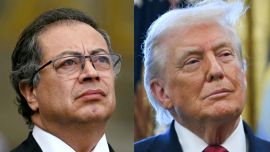Almost 900,000 adolescents aged 16 and 17 have joined the electorate in Argentina this year, eligible to vote in the upcoming PASO (Primarias, Abiertas, Simultáneas y Obligatorias) primaries on September 12 and in the midterms on November 24.
In total, the youth vote now represents 2.51 percent of the electoral roll – a considerable number of ballots to be fought over by the candidates.
Since the 2012 reform of the Citizenry Law, the right to vote in national elections has been extended to youngsters aged between 16 and 18. The change was first implemented in the 2013 midterms when 627,364 youth voters were added to the electorate. While the vote is just as obligatory for this segment as for all adults aged under 70, these youngsters will not be considered legally responsible should they abstain.
For this year’s elections, a total of 861,149 youngsters (437,457 male and 423,692 female) will join the electoral roll in Argentina, according to the Cámara Nacional Electoral (CNE). The largest number corresponds to Buenos Aires Province, the nation’s most populous region, with 333,342 adolescents aged 16 and 17 (169,847 male and 163,495 female), followed by Córdoba Province with 72,459 (36,777 and 35,682); Santa Fe with 63,022 (32,075 and 30,947); the City of Buenos Aires with 51,268 (26,030 and 25,238); and Mendoza Province, with 33,730 (17,232 and 16,498).
Regarding the national electorate of 34,330,557 voters, adolescents aged 16 and 17 represent 2.51 percent. Underlining its size and potential impact, the new youth vote outnumbers the electorate in 12 of Argentina’s 23 provinces.
Since the start of campaigning, candidates have made a concerted effort to increase their outreach to young voters. The ruling Frente de Todos coalition in particular, has been attempting in recent weeks to regain its foothold in that sector of the population, which during the Cristina Fernández de Kirchner presidencies proved to be fruitful for the La Cámpora youth militant grouping.
"I want to ask the youth, [as] a protagonist in the process of imposing changes, to unite all their rebellion to change the injustice and ingratitude in our country," said President Alberto Fernández at a campaign rally earlier this week.
Quilmes Mayor Mayra Mendoza, a leader in La Cámpora, said: "Today we also need the participation of the young. We need our young to know that what we are doing – working every day for the welfare of our neighbours – is beautiful and made possible via politics. Our arms will always be open to them."
The national electorate for the upcoming midterms has increased just over seven percent in comparison with the 2019 presidential elections. On September 12 a total of 34,330,557 citizens will be eligible to vote in the PASO primaries and the November 14 general elections, according to the data published by the CNE. Compared with the 32,064,323 citizens eligible to vote in the 2019 presidential elections, this represents an increase of 7.06 percent.
Buenos Aires Province continues to be the district with the biggest electorate – 12,704,518 electors, making up 37 percent of the national vote.
The podium is completed by the provinces of Córdoba (2,984,631 voters or 8.69 percent) and Santa Fe (2,768,525 or 8.06 percent) while the City of Buenos Aires occupies fourth place with 2,552,058 voters, representing 7.43 percent of the total voters who will define Congress candidacies.
– TIMES/NA
























Comments